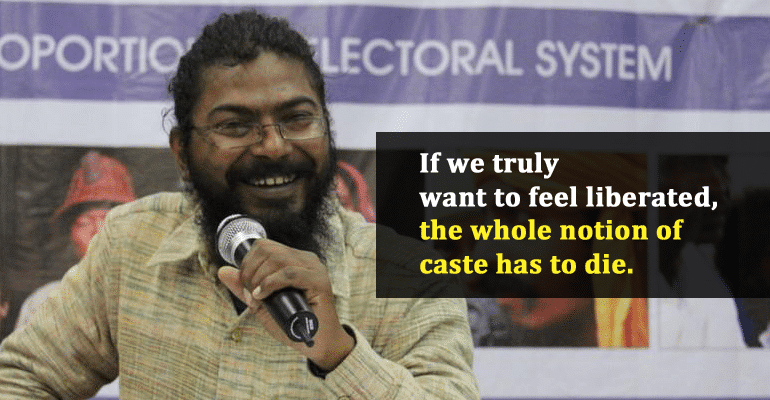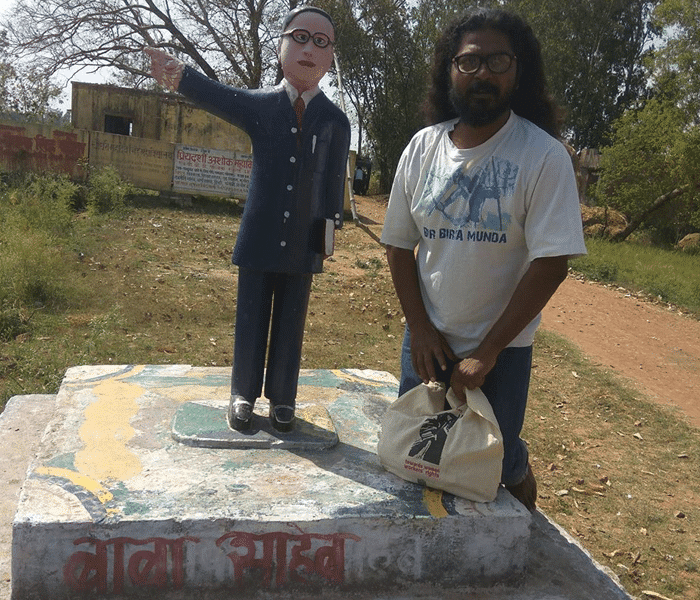He has found his own way, his own language to empower the oppressed, marginalized and exploited sections of the society. And all that he demands is just a political voice for Dalit and tribal women of Chattisgarh.
Life Beyond Numbers spoke to Dr. Goldy M. George, who started Dalit Mukti Morcha to politically empower women from a disadvantaged background.

What he has been doing for the past 28 years was not done by googling or surfing the internet, but by actual field work. He says, “We need to understand how Dalit issues are tackled in this country. If we truly want to feel liberated, the whole notion of caste has to die.”
If you agree with Goldy, you too can support his cause here.
Born in Chhattisgarh, George, 47, is very fond of Chhattisgarhi language, but because of his Keralite parents, Tamil is also close to his heart. Speaking about the caste movements in India, he says, “Do we realize the frames and references of caste and caste movements in this country? Nowadays, we have anti-upper caste movement, not an anti-caste movement in this country.”
Political Voice for Dalit women
Switch on television and you will still find black women as news readers in foreign media houses, then why in India, a woman has to be fair-skinned or pretty enough to qualify for that position? Does one need to fulfill certain beauty standards to get a job in this country?
“There is an unspoken discrimination that exists in the country- a dark-skinned woman is most of the time side-lined from society and things are worst in cases of Dalits and tribal women. They end up either being low-paid or doing undervalued jobs. Having fair skin gives you the authority over people with a dark complexion and somehow the way society behaves, it gives validation to this practice,” says Dr.George.
They will give awards to these women, do stories on them, but when it comes to employment, there is no job for them. This is a political problem as well as a social problem. He says to LBN, “It is not like that all Dalit or tribal women are illiterate. Maybe some are, but there are so many who are educated and fit for jobs. What really makes them different is- despite having so many problems, struggling most of their lives, they are still grounded.”
Empowering these women- be it giving them an equal political voice or focusing on their overall development demand accountability from the state. It requires a transformation of power relationships both within institutions of governance and in the women’s social environment.
“I have strongly come to believe that women can give a new direction to the society. They are not meant to be slaves. Patriarchal mindset makes a woman the ‘second sex’ or the ‘weaker sex’ and because of this they still cannot come out and fight for their freedom and justice. Therefore, this typical mindset needs to be broken down,” he adds.
The Whole Civilized World
There has been a long-standing debate between being civilized and uncivilized. This has always been a tricky issue. The society we live in today, can we call it an advanced society? What are the core characteristics that make one stands out?
“Liberal minds see everyone as equal. When you divide people on basis of caste, class or color- civilization is lost that very moment,” says George.
Living a humble life is important. “While working closely with these people, I have found that they know how to maintain harmony with people and nature. The wisdom of this community is connected with labor. The reason why people from other community are always able to approach them because they see everyone as equals. History bears witness that hardly anyone could ever step inside a Brahmin or Kshatriya zone but everyone can easily explore the Dalit and Adivasi (tribal) zones.”
He has formed the Dalit Study Circle in 2002 and later in 2004, Social Institute for Research Study and Action to identify the problems related to this community and to come up with solutions.
“We need to redefine who is civilized and who are uncivilized. There is a lot to be learned from cultural history. These people define their lives with an old component of love. They maintain harmony with each other, they do not practice any kind of discrimination,” he says.
“The only problem with Dalits is that they don’t know how to narrate or articulate these things but their approach to life depends on love, labor, and liberation. This makes them much more civilized than the rest.”
Annihilation of Caste
William Drummond once said, “He that will not reason is a bigot; he that cannot reason is a fool; and he that dares not reason is a slave.”
Justice, equality, and liberty make a nation great but how can a society establish that when biggest hurdles are not addressed properly. Till date, focussing on the reservation of Dalits has hardly helped in the community development. Dr.George strongly believes what BR Ambedkar once said, that the day cast is destroyed Hinduism will die a natural death.
There are four ways in which issues related to Dalits are tackled in this country– “Some institutions have Dalit leaders but they don’t really take up the cause of Dalits. Some do not have Dalit leaders but they focus on issues related to Dalits. Some group of students comes forward with the idea of mainstreaming Dalits by focusing on reservation related issues, but they cannot go beyond that. Then there are Buddhist conservation groups ask them to accept Buddhism and take care of their needs.”
If you agree with Goldy, you too can support his cause here.
In 2004, Dr.George along with people from movements in various Asian countries co-founded the Centre for Justpeace in Asia. He has to his credit three books, four booklets and 30 papers/chapters in research journals/books and has conducted over two dozen pieces of research in Chhattisgarh, Odisha, Jharkhand, Bihar, Madhya Pradesh, Tamil Nadu, Kerala, and North East India. Further, he has also delivered lectures in many countries abroad, in over 200 national programmes. Currently, he is the Chief Editor of the ‘Journal of People’s Studies’.
That moment when you connect with someone, it is very crucial because you get a window in their lives. The whole notion of empowerment is Freedom- going beyond the limits of establishments or parties. We believe that for George, success is not recognition, but being proud of what one does every day.


